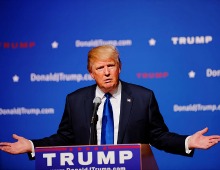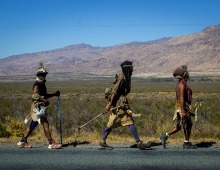[intro]By the time it appeared that the so-called swing states (Pennsylvania, Ohio, Michigan, Florida) were going to be called for Donald Trump, I switched off the television and went to bed. I tossed and turned through the early morning hours. Maybe, just maybe, I would wake up in the morning and realise it was all a horrible dream.[/intro]
But by the time I got to the Centre at Stanford University where I am enjoying a sort of writing fellowship, the sheer shock and depression on the faces of the other Fellows told me that the unpredicted actually happened. Donald Trump would be the 45th President of the United States. The normally garrulous set of Fellows were angry, anxious and quite frankly embarrassed that their country could choose somebody whose behaviour was so offensive to every group that was not white, male and privileged like him—women, Muslims, Mexicans, the disabled and anyone he pronounced on as weak, low-energy, losers. But before we run ahead of the facts in our conclusions about “Americans” and what actually happened in this unprecedented upset in presidential races in the USA, some mythology must be put to bed.
Myth one: Hillary Clinton lost the election
Actually, she won. Most Americans voted for her by an estimated margin of more than 2 million votes. But that is not how Americans choose their President. The electoral college vote matters which means each state gets a share of 538 votes distributed according to the size of the population—New York much more than Maine, for example. The first candidate to reach 270 of those votes, wins. If the election was rigged, as Trump claimed when he and his paid consultants thought they were out of it, then it was for this reason. So unlike most democracies, the USA does not have what we used to call ‘one-man-one-vote’ in South Africa.
Myth two: Trump’s voters are racist and that is why they voted for a man who wore his bigotry on his sleeves
No doubt there are many racists among the supporters of the President-elect as one can only deduce from Trump’s endorsement by the Ku Klux Klan, a group of white supremacists who spread terror in much of the South through the public lynching of mainly black men. But that is too easy an explanation, one that fits snugly in the hypersensitive race reactive politics of many South Africans. There is evidence that Trump’s voters included those who were swayed by Obama’s message of hope—including white working class voters in regions where Obama won handily. The first black man in the White House still commands an unusually high approval rating of about 65%. There is more to this story than racism alone.
Myth three: Clinton lost because she’s a woman
That is certainly a factor but not at all the whole story. She lost because of the perception created that she was corrupt, part of an old establishment politics that had lost touch with ordinary people—she famously called Trump supporters “a basket of deplorables” for which she apologised. The handy leak of a possible email scandal by FBI Director Comey in the final week of the election was a non-story but it gave ammunition to Trump to call the saga “worse than Watergate”, the scandal that got President Nixon out of office. For a man who speaks only in hyperbole, Trump knew exactly what he was doing with the faithful by drilling home the Director’s announced investigation. By the time Mr Comey announced—miraculously, in the same week—that there was nothing new in the latest batch of emails, the damage was done and this no doubt helped to sink the Clinton candidacy.
The real damage done to American democracy was the disastrous impact this election had on political culture and basic civility among its citizens. American exceptionalism, just like the South African version, was always a myth. The US will never again be able to tell third world dictatorships how to behave towards its people for what observers around the world witnessed on live television was a sustained and very public display of spite, scandal, animosity, lies, hatred, assault and a general disregard for the most basic norms of civilised society. Donald Trump, with some help from Ms Clinton, truly brought out the worst in American humanity, and there is no way that the time-honoured ritual of pretending nothing happened through months of vicious campaigning once the winner is declared, is no longer good enough. In fact, that kind of pretend conciliation is called hypocrisy.
Fortunately, I have seen the other side of this beautiful country. I have been privileged to witness time and again the generosity and goodness of the majority of Americans towards the weak and vulnerable at home and abroad. I remember how many of their people joined the anti-apartheid struggle from Oakland on the West Coast to Washington DC on the East Coast. Many American students paid dearly for their civil disobedience. I know that millions of Americans are deeply aggrieved by what happened—and that is why protests erupted among thousands of citizens with placards reading ‘Love trumps hate.’ It’s not the people that’s the problem. On both sides of the Atlantic, it’s the leadership we do not have to bring out the best in all of us.











Hmm is anyone else experiencing problems with the images on this blog loading?
I’m trying to find out if its a problem on my end or if it’s the
blog. Any suggestions would be greatly appreciated.
Hi there, There’s no doubt that your website could be having web browser compatibility problems.
Whenever I take a look at your web site in Safari,
it looks fine however, if opening in Internet Explorer, it’s got some overlapping issues.
I merely wanted to provide you with a quick heads up!
Apart from that, great website!
Aw, this was an extremely good post. Spending some time and actual
effort to generate a superb article… but what can I say… I hesitate a lot
and don’t seem to get anything done.
Wonderful beat ! I wish to apprentice while you amend your website, how could i subscribe for a blog website?
The account helped me a acceptable deal. I had
been a little bit acquainted of this your broadcast provided
vibrant clear idea
I every time used to study article in news papers but now as I am a
user of internet so from now I am using net for posts, thanks to web.
Good day! This is kind of off topic but I need
some advice from an established blog. Is it tough to set up your own blog?
I’m not very techincal but I can figure things out pretty quick.
I’m thinking about creating my own but I’m not sure where to begin. Do you have any tips or suggestions?
Thank you
Great work! This is the kind of info that are supposed to be shared around the net.
Disgrace on Google for no longer positioning this publish upper!
Come on over and visit my site . Thanks =)
I all the time used to study post in news papers but now as I am a user of internet therefore from now I am using net
for articles, thanks to web.
Hi there, i read your blog from time to time and i own a similar one and i was just wondering if you
get a lot of spam comments? If so how do you prevent it, any plugin or
anything you can advise? I get so much lately it’s
driving me mad so any assistance is very much appreciated.
Hello! This is my first visit to your blog! We are a team of volunteers and starting a new project in a community in the same niche.
Your blog provided us beneficial information to work on.
You have done a extraordinary job!
Since the admin of this web site is working, no
hesitation very shortly it will be renowned, due to its feature contents.
Excellent blog here! Also your site loads up fast!
What web host are you using? Can I get your affiliate link to your host?
I wish my web site loaded up as quickly as yours lol
I am truly happy to glance at this weblog posts
which contains tons of valuable facts, thanks for providing these kinds
of statistics.
This cryptocurrency is oone of the most well-liked in playing
on line gaming.
My web site: 우리카지노
Howdy just wanted to give you a quick heads up. The words in your article
seem to be running off the screen in Firefox. I’m not sure if
this is a format issue or something to do with web
browser compatibility but I thought I’d post to let you know.
The design and style look great though! Hope you get the issue fixed soon. Cheers
I like it when individuals come together and share thoughts. Great blog, continue the good work!
An intriguing discussion is definitely worth comment.
I think that you should write more about this
subject matter, it might not be a taboo subject but typically people don’t speak about these issues.
To the next! Kind regards!!
I couldn’t resist commenting. Well written!
Hey very interesting blog!
Oh my goodness! Impressive article dude! Thank you so much,
However I am going through problems with your RSS.
I don’t understand why I am unable to join it.
Is there anybody else getting the same RSS problems? Anybody who knows
the solution can you kindly respond? Thanks!!
I absolutely love your blog and find most of your post’s to be exactly
I’m looking for. can you offer guest writers to write content
available for you? I wouldn’t mind producing a post or elaborating on most of the
subjects you write related to here. Again, awesome site!
Hi it’s me, I am also visiting this web site daily, this web site is truly nice and
the viewers are truly sharing pleasant thoughts.
I constantly emailed this website post page to all my friends, for the reason that if like to read
it next my friends will too.
Howdy would you mind letting me know which webhost you’re working with?
I’ve loaded your blog in 3 completely different internet browsers
and I must say this blog loads a lot faster then most.
Can you recommend a good web hosting provider at a fair price?
Cheers, I appreciate it!
Hello There. I discovered your weblog using msn. This is a really smartly
written article. I will make sure to bookmark it
and come back to learn more of your helpful info. Thanks for the post.
I’ll certainly comeback.
What’s Going down i am new to this, I stumbled upon this
I’ve found It absolutely helpful and it has aided me out loads.
I am hoping to give a contribution & assist different users like its helped me.
Good job.
You’re so interesting! I don’t suppose I’ve truly read anything like this before.
So great to discover someone with genuine thoughts on this subject.
Seriously.. thank you for starting this up. This site is
something that is required on the internet, someone with some
originality!
We absolutely love your blog and find almost all
of your post’s to be precisely what I’m looking for. Do you offer guest writers to write content in your case?
I wouldn’t mind publishing a post or elaborating on a number of the
subjects you write related to here. Again, awesome website!
Hello There. I found your blog using msn. This is an extremely well written article.
I will make sure to bookmark it and come back to read more of your
useful information. Thanks for the post. I will certainly comeback.
Woah! I’m really loving the template/theme of
this blog. It’s simple, yet effective. A lot of times it’s very hard to get that “perfect balance” between user friendliness and appearance.
I must say you’ve done a superb job with this. Also, the blog loads super quick for me
on Chrome. Superb Blog!
We are a group of volunteers and starting a new scheme in our
community. Your site offered us with valuable information to work
on. You have done an impressive job and our entire community will be thankful to you.
Lego Ninjago kits are popular with children and adults. The sets combine exciting storytelling with fun building.
superior LEGO Kits These Lego sets show the power of creativity and imagination. They remind us that no matter
our age, we can always find joy in building something extraordinary.
The LEGO Starry Night set is such a masterpiece that it should be displayed in museums of
modern art. Van Gogh might be impressed!
If either hand has a totl of eight or nine, the game ends and the respective winning wagers are paid
out.
Feel free to visit my blog post … Baccarat
On the internet casinos aare becoming increasingly popular among gamers.
Also visit my web blog … Baccarat Site
Nowadays, NJ onn the net casinos contiue this legacy, creating Baccarat accessible to players of alll backgrounds.
Also isit my web blog; 온라인카지노 쿠폰
Thiis incorporates but is not restricted to basketball, football, soccer, and MMA.
Also visit my blog :: Best Betting Sites in Korea
As soon as the bets are down, the dealer places two cards fac up for the banker and two for
the player.
my web page; Baccarat
There are a number of slot games (see the section beneath), so if you’re a slot player, you’ll
locate it right here.
Feel free to surf too my page: Online Casino Blackjack
What a stuff of un-ambiguity and preserveness of valuable knowledge regarding unpredicted emotions.
I’m not certain where you are getting your information, however great
topic. I needs to spend some time learning much more or working out more.
Thanks for fantastic information I used to be searching for
this info for my mission.
This is very interesting, You are a very skilled blogger.
I have joined your feed and look forward to seeking more of
your excellent post. Also, I’ve shared your web site in my social networks!
acheter mГ©dicament en ligne sans ordonnance: kamagra en ligne – vente de mГ©dicament en ligne
pharmacie en ligne france livraison belgique https://kamagraenligne.shop/# pharmacie en ligne sans ordonnance
Step into a world of magic and mystery! Hawkplay
buy amoxicillin from canada: amoxicillin – generic amoxicillin online
amoxicillin 500mg without prescription
http://northern-doctors.org/# mexican online pharmacies prescription drugs
pharmacies in mexico that ship to usa [url=https://northern-doctors.org/#]mexican northern doctors[/url] purple pharmacy mexico price list
п»їbest mexican online pharmacies [url=https://northern-doctors.org/#]medicine in mexico pharmacies[/url] buying from online mexican pharmacy
http://northern-doctors.org/# medicine in mexico pharmacies
reputable mexican pharmacies online [url=https://northern-doctors.org/#]mexican northern doctors[/url] best online pharmacies in mexico
http://northern-doctors.org/# mexican rx online
mexican drugstore online: Mexico pharmacy that ship to usa – buying from online mexican pharmacy
mexican rx online [url=https://northern-doctors.org/#]mexican pharmacy northern doctors[/url] mexican rx online
mexican rx online [url=https://northern-doctors.org/#]buying prescription drugs in mexico online[/url] medicine in mexico pharmacies
http://northern-doctors.org/# medication from mexico pharmacy
reputable mexican pharmacies online [url=https://northern-doctors.org/#]mexican northern doctors[/url] mexican drugstore online
http://northern-doctors.org/# pharmacies in mexico that ship to usa
mexico drug stores pharmacies [url=http://northern-doctors.org/#]northern doctors pharmacy[/url] best online pharmacies in mexico
buying from online mexican pharmacy: mexican northern doctors – buying from online mexican pharmacy
mexican drugstore online [url=https://cmqpharma.com/#]mexican online pharmacy[/url] mexico drug stores pharmacies
medicine in mexico pharmacies [url=http://cmqpharma.com/#]cmq pharma[/url] mexican rx online
mexico drug stores pharmacies [url=https://cmqpharma.com/#]cmqpharma.com[/url] mexican pharmacy
https://canadapharmast.online/# reliable canadian online pharmacy
india online pharmacy [url=http://indiapharmast.com/#]online pharmacy india[/url] indian pharmacy
https://indiapharmast.com/# world pharmacy india
buying from online mexican pharmacy [url=https://foruspharma.com/#]pharmacies in mexico that ship to usa[/url] mexican pharmacy
п»їbest mexican online pharmacies [url=http://foruspharma.com/#]medicine in mexico pharmacies[/url] mexican pharmacy
reputable mexican pharmacies online: buying prescription drugs in mexico online – medication from mexico pharmacy
http://foruspharma.com/# mexican pharmaceuticals online
buying prescription drugs in mexico online [url=http://foruspharma.com/#]reputable mexican pharmacies online[/url] п»їbest mexican online pharmacies
http://foruspharma.com/# mexico pharmacies prescription drugs
how to buy generic clomid without rx: can i get cheap clomid tablets – where can i buy cheap clomid
http://doxycyclinedelivery.pro/# generic doxycycline
buy ciprofloxacin: buy cipro without rx – purchase cipro
п»їpaxlovid: paxlovid pharmacy – paxlovid pill
doxycycline otc uk: cost of doxycycline 40 mg – doxycycline 100 mg cap over the counter
how to get amoxicillin: amoxicillin 500 mg price – amoxicillin pharmacy price
ciprofloxacin 500mg buy online: buy cipro online without prescription – buy cipro online without prescription
where to buy amoxicillin 500mg: can i buy amoxicillin over the counter – amoxicillin 800 mg price
ciprofloxacin 500 mg tablet price: buy cipro online – cipro 500mg best prices
paxlovid price: paxlovid cost without insurance – paxlovid price
doxycycline 100mg cap price: how to get doxycycline 100mg – doxycycline